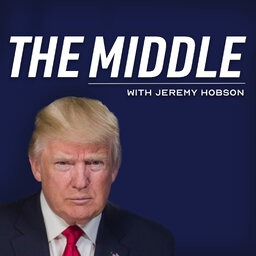OTTD: Signalgate and the Future of Pete Hegseth's Pentagon
In this episode of One Thing Trump Did, we discuss Signalgate, shakeups in the Defense Department and some of the major headlines in National Security. Jeremy is joined by Courtney Kube, an NBC News Correspondent who covers National Security and the Military. #DoD #Signalgate #Signal #Yemen #military #recruitment #Trump #Hegseth #Waltz
In 1 playlist(s)
The Middle with Jeremy Hobson
The Middle with Jeremy Hobson is a national call-in talk show focused on bringing the voices of Amer…Social links
Follow podcast
Recent clips

The Follow Up: Fear in Trump's First Year, Michigan and the Midterms
22:56

One year of Trump: How are His Policies Affecting You?
49:39

The Follow Up: Minneapolis, Maduro’s Capture, and the First Days of Mamdani
26:52
 The Middle with Jeremy Hobson
The Middle with Jeremy Hobson